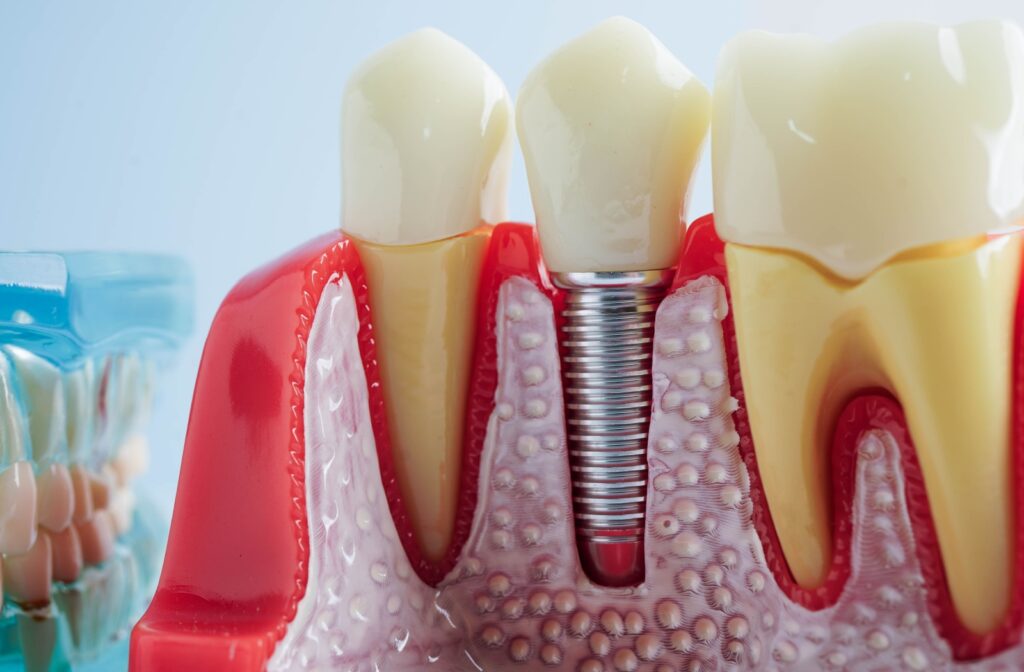Everyone deserves to have a smile they love, and dental implants offer a reliable solution for those looking to restore both function and aesthetics.
These fixtures serve as artificial tooth roots. They are crafted from biocompatible materials like titanium and are surgically placed into the jawbone to support crowns, bridges, or dentures. With the right care, dental implants can last a lifetime, offering a permanent solution for restoring your smile.
The Longevity of Dental Implants
- Dental implants are designed to be permanent. Their lifespan largely depends on preventing failure rather than the implants themselves breaking down. One of the ways your dentist can help avoid this is by ensuring you are a suitable candidate. Unfortunately, not everyone is. Ideal candidates must have:
- Healthy gums
- A sufficient amount of jawbone strength
- Good health overall
A dentist could recommend a bone graft if you do not have enough jaw strength to support the implant. Otherwise, the implant could fail. For those who are suitable, implants have a remarkable success rate of 90–95% over a decade, making them a dependable choice for long-term oral health.
The porcelain crown that sits atop the implant, however, may need replacement over time due to wear. Depending on the material and maintenance, crowns can last between 10–20 years.
What Affects Implant Longevity?
If an implant does fail, a dentist can usually discover the cause. It is important to visit every 6 months for a check-up, as it allows your dentist to examine the implant and crown to determine if they are still in good shape.
Here are some factors that can affect your implant’s lifespan:
Good Oral Hygiene
Plaque buildup can lead to gum disease, compromising implant stability. This happens because the infection can weaken your jawbone or cause gum tissue to recede. Brush twice daily and floss around your implant to help clear away plaque before it becomes tartar. Your dentist might suggest specific tools like non-abrasive toothpaste or interdental brushes to care for your implants properly.
Teeth Grinding (Bruxism)
Bruxism refers to the unconscious habit of grinding teeth. This constant pressure can damage the crown, the abutment that connects the crown to the implant, or even the implant itself. This can be a difficult factor to recognize, as many people who grind their teeth do it while they are sleeping. Often, a dentist will be the first one to raise the alarm bells during a regular check-up.
Correcting bruxism can mean addressing potential causes such as stress or poor sleep habits. Mindfulness practices or stress-relief techniques can help mitigate this risk, as can limiting caffeine or alcohol intake.
Lifestyle Habits
Your lifestyle choices heavily influence implant health. Smoking, for instance, restricts blood flow to the surgery site, delaying healing and increasing implant failure risk. Studies indicate that implant failure is more than twice as common in smokers.
Additionally, eating too many sugary foods can increase the amount of plaque on your teeth and compromise your oral health. Adopting healthier habits can significantly improve the outcome of your implant surgery.
Medical Conditions & Medication
Certain medical conditions and medications can affect how the implant fuses to your jawbone. Conditions that can impact healing and bone fusion include:
- Diabetes
- Osteoporosis
- Cardiovascular issues
- Lowered immune system
Medications such as immunosuppressants or blood thinners also heighten the risk of implant failure. It’s essential to discuss your medical history and current medications with your dentist before proceeding with implant surgery.
Tips for Prolonging the Lifespan of Your Dental Implants
Think of your dental implants like any other natural tooth in your mouth. They require similar care and neglecting them can leave you in the same position you were in before surgery.
Some guidelines to help you get the most out of your implant include:
- Focus on good oral hygiene: Brush and floss regularly to prevent plaque buildup and gum disease.
- Keep to regular dental checkups: Schedule appointments every 6 months for a professional cleaning and checkup.
- Avoid hard foods: Chewing on hard food like ice or candy can damage crowns.
- Eat a balanced diet: Calcium and vitamin D are only some of the nutrients that can strengthen your teeth. However, hold off on the dairy immediately after surgery to avoid inflammation.
- Quit smoking: Quitting smoking improves overall oral health and implant success rates.
- Manage medical conditions: Keep chronic conditions under control and update your dentist on any medications you’re taking.
Secure Your Smile with Dental Implants
Dental implants can offer a long-lasting solution to tooth loss, marrying functionality with aesthetics for a smile that can last a lifetime. It takes the right care, but you do not have to figure it out by yourself. The Kensington Dental Care team is ready to provide personalized advice from consultation to aftercare.
Request an appointment with us today and discover if dental implants are the answer you have been looking for.










